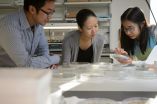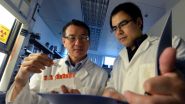(Press-News.org) EAST LANSING, Mich. – The discovery of a cellular snooze button has allowed a team of Michigan State University scientists to potentially improve biofuel production and offer insight on the early stages of cancer.
The discovery that the protein CHT7 is a likely repressor of cellular quiescence, or resting state, is published in the current issue of the Proceedings of the National Academy of Sciences. This cellular switch, which influences algae's growth and oil production, also wields control of cellular growth – and tumor growth – in humans.
Christoph Benning, MSU professor of biochemistry and molecular biology, and his colleagues unearthed the protein's potential while seeking ways to improve algae's capacity as a biofuel. Its application in cancer research, however, was a surprise finding that is leading Benning's lab in a new direction.
"Algae provide us with model organisms that rival, or possibly exceed, traditional yeast models," Benning said. "It's quite difficult to grow many types of human cells in test tubes. However, we can readily grow, manipulate and study algae, which have the genomic repertoire that make them relevant in their capacity to drive advances in human medicine."
The discovery was made while tackling the conundrum of algae's vexing inverse relationship with growing mass versus producing oil. When algae are awake, they grow; when they're asleep, they produce oil.
"Producing oil is part of the cells' survival strategy when it's under stress," said Chia-Hong Tsai, doctoral candidate with MSU's Department of Energy Plant Research Laboratory and Department of Plant Biology and co-author. "They go into quiescence to conserve energy and nutrients. That's when they produce the equivalent of vegetable oil. But to convert them into truly viable biofuel producers, we need them to grow and produce oil simultaneously."
The secret for making this happen was CHT7 – the gatekeeper that cues cells to wake up or fall asleep. By engineering this protein, Benning's team might one day develop an organism that can't figure out how to doze and is always active. For biofuels, this would remove a major hurdle and gives scientists a way to potentially produce high amounts of oil and biomass.
In terms of human medicine, this discovery gives scientists a promising new model to study tumor suppression and growth. Because quiescent cells are found in many plants and animals, it's a model that can provide important insights into the regulation of cellular behavior in organisms, such as us humans, in ways that traditional yeast models simply can't replicate.
"For cancer research, it's a new paradigm," Benning said. "The switch that tells an organism to grow, or possibly, go rogue and grow uncontrollably – that's exactly what we want to understand. That is the first step of tumor growth."
INFORMATION:
Additional MSU team members included Jaruswan Warakanont, plant biology doctoral student; Tomomi Takeuchi, biochemistry and molecular biology doctoral student; Barbara Sears, professor emeritus of genetics and plant biology; and Eric Moellering, former doctoral candidate of biochemistry and molecular biology now at Synthetic Genomics Inc.
Benning's lab is pursuing each aspect of this research and applying for grants to advance both fronts.
Michigan State University has been working to advance the common good in uncommon ways for more than 150 years. One of the top research universities in the world, MSU focuses its vast resources on creating solutions to some of the world's most pressing challenges, while providing life-changing opportunities to a diverse and inclusive academic community through more than 200 programs of study in 17 degree-granting colleges.
For MSU news on the Web, go to MSUToday. Follow MSU News on Twitter at twitter.com/MSUnews.
Discovery of cellular snooze button advances cancer and biofuel research
2014-10-14
ELSE PRESS RELEASES FROM THIS DATE:
Sustained feedback to doctors may help maintain appropriate antibiotic usage in children
2014-10-14
A program that provides guidance to primary care physicians about appropriately prescribing antibiotics for children is effective, but its improvements wear off after regular auditing and feedback are discontinued.
"Our findings suggest that interventions with outpatient healthcare providers should include continued feedback to clinicians to remain effective," said study leader Jeffrey S. Gerber, M.D., Ph.D., an infectious diseases specialist at The Children's Hospital of Philadelphia (CHOP).
Gerber and colleagues from CHOP published their research online Oct. 10 in ...
Earliest-known lamprey larva fossils unearthed in Inner Mongolia
2014-10-14
LAWRENCE — Few people devote time to pondering the ancient origins of the eel-like lamprey, yet the evolutionary saga of the bloodsucker holds essential clues to the biological roots of humanity.
Today, the Proceedings of the National Academy of Sciences published a description of fossilized lamprey larvae that date back to the Lower Cretaceous — at least 65 million years ago.
They're the oldest identified fossils displaying the creature in stages of pre-metamorphosis and metamorphosis.
"Among animals with backbones, everything, including us, evolved from ...
Stress may be harder on women's hearts than men's
2014-10-14
DURHAM, N.C. -- Researchers have known for decades that stress contributes to heart disease. But a new analysis by researchers at Duke Medicine shows mental stress may tax women's hearts more than men's.
The research appears online Oct. 13, 2014, in the Journal of the American College of Cardiology.
"Normally when under stress, we fight back or run away. In order to do that, we need to pump more blood to the body," said Wei Jiang, M.D., the study's senior author and professor of medicine, psychiatry and behavioral sciences at the Duke University School of Medicine. ...
Beyond LEDs: Brighter, new energy-saving flat panel lights based on carbon nanotubes
2014-10-14
Washington D.C., October 14, 2014 -- Even as the 2014 Nobel Prize in Physics has enshrined light emitting diodes (LEDs) as the single most significant and disruptive energy-efficient lighting solution of today, scientists around the world continue unabated to search for the even-better-bulbs of tomorrow.
Enter carbon electronics.
Electronics based on carbon, especially carbon nanotubes (CNTs), are emerging as successors to silicon for making semiconductor materials. And they may enable a new generation of brighter, low-power, low-cost lighting devices that could challenge ...
Rats of New York and the diseases they carry
2014-10-14
In the first study to look at would-be diseases carried by New York City rats, scientists at the Center for Infection and Immunity at Columbia University's Mailman School of Public Health identified bacterial pathogens, including E. coli, Salmonella, and C. difficile, that cause mild to life-threatening gastroenteritis in people; Seoul hantavirus, which causes Ebola-like hemorrhagic fever and kidney failure in humans; and the closest relative to human hepatitis C. Results appear in the journal mBio.
The researchers trapped 133 Norway rats at 5 sites in New York City, ...
'Grapes of Wrath': Stomping out grape disease one vineyard at a time
2014-10-14
Cracking the genetic code of a common disease affecting grape production could improve vineyard management and help protect the multibillion-dollar industry that includes raisins, juice, jam/jelly, fresh grapes, grape-seed extract and oil, vinegar and wine.
A Rochester Institute of Technology scientist and an RIT alumnus are close to completing the genetic blueprint, or microbiome, of grape crown gall tumor disease—the bane of vineyards worldwide. Their study focuses on 16 grape varieties, including Cabernet Sauvignon and Riesling, from vineyards in the New York ...
Brand loyalty: What happens when our favorite products are unavailable?
2014-10-14
What would happen to all those millions of Snickers fans if their favorite chocolate bar was temporarily out of stock? Would they wait for it to be available again or would they quickly switch allegiance to Milky Way or Kit Kat? According to a new study in the Journal of Consumer Research, when you can't get your favorite product, you'll quickly forget about it if you can find a good replacement.
"We studied situations in which products are temporarily unavailable. We found that desire for a product depends on the amount of time that has passed since a consumer was able ...
New treatment target identified for aggressive breast cancer
2014-10-14
AUGUSTA, Ga. – One of the first-known oncogenes has a protein partner that helps breast cancer proliferate and when it's blocked, so is the cancer, scientists report.
The gene ErbB2, commonly called HER2, is highly expressed in about 25 percent of breast cancers. Scientists have now found the protein Erbin, thought to be an anti-tumor factor, also is highly expressed in these cancers and essential to ErbB2's support of breast cancer.
When scientists interfere with the interaction between the two in mice, it inhibits tumor development and the usual spread to the ...
Forced to be bad: When eating that chocolate cake is 'not our fault'?
2014-10-14
Imagine you're dining out with a friend who insists on sharing some chocolate cake for dessert. Since the decision has already been made for you, you gladly join in without feeling any regret. According to a new study in the Journal of Consumer Research, consumers are happier when someone else decides they can indulge in dessert or other guilty pleasures.
"Most of us don't like being forced to do things. The freedom to make our own decisions generally energizes us and increases our sense of well-being. However, when it comes to purchasing and consuming products normally ...
Country of origin: Are negative stereotypes always bad for business?
2014-10-14
Consumers worldwide associate France with fashion and luxury and are willing to pay a lot for French luxury products such as perfume and wine. But what about products made in countries with less favorable reputations? A new study in the Journal of Consumer Research shows that consumers won't judge a country's products by its reputation if the products are well-made.
"Positive feelings about a country don't always translate into more favorable opinions of its products. A positive opinion of a country may actually make consumers think more about whether or not the country ...





